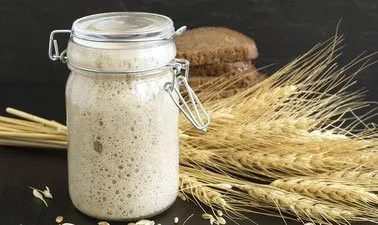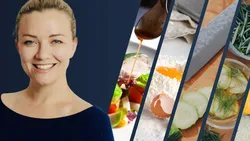
Food Fermentation: The Science of Cooking with Microbes 
This course explores the science of food fermentation, which uses bacteria, fungi, and other microorganisms to produce unique flavors and characteristics in food. Through this process, students will learn how to use microbes to create delicious dishes and gain a better understanding of the microbial world. ▼
ADVERTISEMENT
Course Feature
![]() Cost:
Cost:
Free
![]() Provider:
Provider:
Edx
![]() Certificate:
Certificate:
Paid Certification
![]() Language:
Language:
English
![]() Start Date:
Start Date:
Self paced
Course Overview
❗The content presented here is sourced directly from Edx platform. For comprehensive course details, including enrollment information, simply click on the 'Go to class' link on our website.
Updated in [March 06th, 2023]
Food Fermentation: The Science of Cooking with Microbes is a course that explores the history and science of food fermentation. Through hands-on, at-home exercises, participants will experiment with their food to grow their own microbial environments to make mead, sourdough, tempeh, and more. The course will analyze the role of microbes in production, preservation, and enhancement of diverse foods across a variety of culinary traditions. Participants will also discuss how and why fermentation does or does not happen and what conditions should be considered to create the right growth opportunities.
[Applications]
Upon completion of this course, participants will be able to apply the knowledge they have gained to create their own fermented foods. They will be able to understand the history of food and beverage fermentations, and how it changes and enhances flavors, aromas, and tastes. Participants will also be able to analyze the role of microbes in production, preservation, and enhancement of diverse foods across a variety of culinary traditions. Additionally, they will be able to engage in kitchen science, discussing how and why fermentation does or does not happen and what conditions should be considered to create the right growth opportunities.
[Career Paths]
1. Food Scientist: Food scientists are responsible for researching, developing, and improving food products. They analyze food ingredients, develop new food products, and test the nutritional value of food products. They also work to ensure that food products are safe and meet quality standards. As the demand for healthier and more sustainable food products increases, food scientists are increasingly in demand.
2. Food Microbiologist: Food microbiologists study the microorganisms that are present in food and how they affect food safety, quality, and nutrition. They also work to develop methods to detect and control food-borne pathogens. With the rise of food safety concerns, food microbiologists are becoming increasingly important in the food industry.
3. Food Technologist: Food technologists are responsible for developing new food products and improving existing ones. They analyze food ingredients, develop new recipes, and test the nutritional value of food products. They also work to ensure that food products meet quality standards and are safe for consumption. As the demand for healthier and more sustainable food products increases, food technologists are increasingly in demand.
4. Fermentation Specialist: Fermentation specialists are responsible for researching, developing, and improving fermented food products. They analyze food ingredients, develop new fermentation processes, and test the nutritional value of fermented food products. They also work to ensure that fermented food products are safe and meet quality standards. With the rise of interest in fermented foods, fermentation specialists are becoming increasingly important in the food industry.
[Education Paths]
1. Food Science Degree: A Food Science degree is a great way to learn about the science behind food fermentation and other food-related topics. This degree typically covers topics such as food safety, food chemistry, food microbiology, food engineering, and food processing. It also provides students with the opportunity to gain hands-on experience in the lab and in the kitchen. With the rise of the food industry, this degree is becoming increasingly popular and is a great way to get a job in the food industry.
2. Microbiology Degree: A Microbiology degree is a great way to learn about the microorganisms that are involved in food fermentation. This degree typically covers topics such as microbial genetics, microbial physiology, microbial ecology, and microbial biochemistry. It also provides students with the opportunity to gain hands-on experience in the lab and in the kitchen. With the rise of the food industry, this degree is becoming increasingly popular and is a great way to get a job in the food industry.
3. Food Technology Degree: A Food Technology degree is a great way to learn about the technology behind food fermentation and other food-related topics. This degree typically covers topics such as food safety, food chemistry, food engineering, food processing, and food packaging. It also provides students with the opportunity to gain hands-on experience in the lab and in the kitchen. With the rise of the food industry, this degree is becoming increasingly popular and is a great way to get a job in the food industry.
4. Food Business Degree: A Food Business degree is a great way to learn about the business side of food fermentation and other food-related topics. This degree typically covers topics such as food marketing, food economics, food law, food policy, and food entrepreneurship. It also provides students with the opportunity to gain hands-on experience in the lab and in the kitchen. With the rise of the food industry, this degree is becoming increasingly popular and is a great way to get a job in the food industry.
Course Provider

Provider Edx's Stats at AZClass
Discussion and Reviews
0.0 (Based on 0 reviews)
Explore Similar Online Courses

Understanding Enterprise-level Agile Implementation and Agile Frameworks

Storytelling in the Workplace

Python for Informatics: Exploring Information

Social Network Analysis

Introduction to Systematic Review and Meta-Analysis

The Analytics Edge

DCO042 - Python For Informatics

Causal Diagrams: Draw Your Assumptions Before Your Conclusions

Whole genome sequencing of bacterial genomes - tools and applications

Culinary Education 101 - The Cooking Like a Chef Crash Course

Madhur Jaffrey Teaches Indian Cooking

Dominique Crenn Teaches Modern Vegetarian Cooking
 Related Categories
Related Categories
 Popular Providers
Popular Providers
Quiz
 Submitted Sucessfully
Submitted Sucessfully
1. What is the main purpose of this course?
2. What type of microorganisms are used in fermentation?
3. What is the main goal of this course?


Start your review of Food Fermentation: The Science of Cooking with Microbes